Vicarious MFA: Home stretch
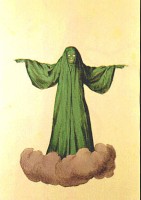
The Vicarious MFA!
Informal survey: Are writers with MFA’s the only writers who give a damn what people in other MFA programs are reading? If so, thanks to all you non/anti-MFA HTML giant readers who put up with the all this MFA chatter. Here is your last dose of Vicarious MFA hoo-hah.

+ Surprise guest class with Richard Ford!
Before the class, everyone who signed up for it read Indian Uprising by Donald Barthelme, Louis Menand’s New Yorker article about Barthelme , and an interview with Umberto Eco. Richard Ford talked about Barthelme for a little while and we asked him a lot of questions about his writing process, philosophy and ideas about the collage element that is innate in all forms/types of writing. He brought his “notebook” to class, which, in fact, was not a notebook at all. It was a huge, purple, three-ring binder in which he collects quotes, thoughts, facts, research, etc for whatever novel he’s working on at the time. He told us about how he’s dyslexic and how that effects his writing. At one point Ford said, “Rick Moody, who I deeply disrespect, once said something about how there are only two kinds of writers: writers like Hemingway and writers like Beckett. I disagree with that… It’s too narrow a perspective on what a writer can be…Writing is supposed to broaden your world, open things up… Rick is probably a nice boy, he just says silly things.” I got to chat with Ford for a moment afterwards, just to say thanks and hello. I was excited about this because we are both from Mississippi and we’ve both lived in New Orleans, which is the nearest refuge for people born in Mississippi. We talked about New Orleans for a minute, how easy it is to get nostalgic about New Orleans and how we both want to buy houses there.
More Highlights:
+Amy Benson made strawberry-rhubarb pound cake for our last meeting of Non/Fiction. I turned in a monster crazy-weird essay that I will be excited to get her feedback on.
+Last workshop is kicked off with a few bottles of champagne, which went straight to everyones’ heads, loosening a hysteria of honesty. It was a good group, but I will be happy not to have to read anyone else’s first drafts for a while.
The Vicarious MFA: The Rings of Saturn, Phantom week, etc.
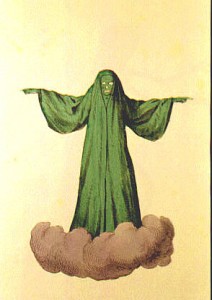
The Vicarious MFA!
The semester is almost over; just six class meetings left and about 47 parties. I omitted last week because I was trying to give you the “full experience” of getting an MFA. There will always be something that you weren’t around for (I missed George Saunders’s and Gary Lutz’s guest lectures last year) or some class that you were too sleep-deprived to actually understand. (Ok, actually, I was busy.)
Today in Non/Fiction we’re talking about W.G. Sebald’s The Rings of Saturn. Class discussion should go something like this: I liked it. It was weird. I didn’t like it. Man, he was doing a whole lot of stuff in there! Whew!
Awesome quote from The Rings of Saturn about what happens when you spend a lot of time writing:
“For days and weeks on end one racks one’s brains to no avail, and, if asked, one could not say whether one goes on writing purely out of habit, or a craving for admiration, or because one knows not how to do anything other, or out of sheer wonderment, despair or outrage any more than one could say whether writing renders one more perceptive or more insane. Perhaps we all lose our sense of reality to the precise degree to which we are engrossed in our own work, and perhaps that is why we see in the increasing complexity of our mental constructs a means for greater understanding, even while intuitively we know that we shall never be able to fathom the imponderables that govern our course through life.
A summary of the phantom week is after the jump.
Vicarious MFA: Extracurricular Activities
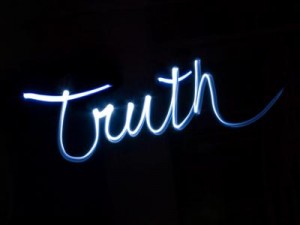
Can we handle it?
Last year I took a class from the illustrious Leslie Sharpe titled “Can The Truth Be Told?” Since then I’ve been thinking a lot about truth in creative writing. What is truth if it’s not fact? When does fact get in the way or truth and truth in the way of fact? Can creativity get along with factuality? What is emotional truth (other than a bomb shelter for the fake memoirists) and does it have a use in the “real” memoir. Can we even consider our memories as forms of truth?
As the panels editor for Columbia: A Journal of Literature and Fine Art I get a chance to wrangle together some people who are a lot smarter than me and ask them to think about these things and then have a public discussion about it. (Our very own Justin Taylor moderated the one we organized in the fall on Literary Dichotomies which featured Heidi Julavits, Nathaniel Rich, Shelley Jackson and Mark Grief.)
The spring panel is titled True Stories and it will take place on Friday April 17 at Housing Works Bookstore. It starts at 7 pm. Brenda Wineapple will be moderating and the panel will feature David Shields, Rachel Zucker and David Ebershoff. Bios after the jump… READ MORE >
April 8th, 2009 / 12:12 pm
Vicarious MFA: Family Time!
Books read since last post: Running in the Family by Michael Ondaatje and Life on the Outside by Jennifer Gonnerman.
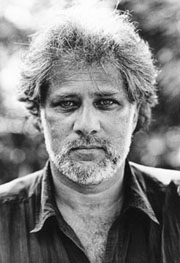
Michael Ondaatje
In Non/Fiction we discussed Running in the Family, a beautiful memoir of Michael Ondaatje’s unbelievably lush, gin-swilling family who lived on Ceylon, an island off the coast of India. Some people in class were disappointed/confused that Ondaatje didn’t really approach the whole colonialism aspect of a British family living in India and having servants. Most people didn’t care that much because they were distracted by the beauty of the book. Each chapter reads like a prose poem and there’s no overt narrative arc. It’s more like a book of poetry masquerading as a memoir.
For The First Book seminar we read Jennifer Gonnerman’s Life on the Outside, a ridiculously impressive book about Elaine Bartlett, a woman
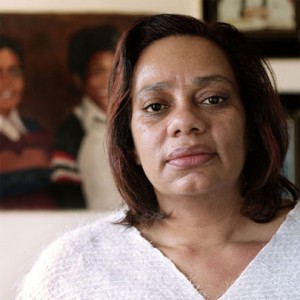
Elaine Bartlett (Photo by Heather Conley)
who was sentenced to 25 years of jail time under the Rockefeller Drug Laws after being set up by a drug dealer working for the cops. The book focuses on the Bartlett family’s struggle to make ends meet before, during and after Elaine’s prison time. She served 16 years before being granted clemency in 2000. I can’t even begin to explain how well this book was written. The amount of information Gonnerman gets the reader to understand and remember about Elaine’s set up, her huge family, the Rockefeller drug laws, and the myriad complications before and after the jail sentence is nothing short of phenomenal. The Rockefeller drug laws were repealed by Gov. David Patterson last week and Elaine Bartlett’s story had an impact in that decision.
Read for Next Week:
Non/Fiction: Oh, wait, I forgot. Will update this later today.
The First Book: The Virgin Suicides by Jeffery Eugenides
And of course, workshop submissions.
Vicarious MFA: Post-Vacation Malaise

The Vicarious MFA
The only obligation to which in advance we may hold a novel, without incurring the accusation of being arbitrary, is that it be interesting. -Henry James (see to do # 3 for more on this)
If you’re following along with the V-MFA this is the part of the semester where all your assignments and deadlines converge and you get dangerously close to caffeine-induced combustion.
TO DO:
1. Though Lethem’s 4-week master class is over, the essay has been due for a week and, so get to work.
2. Workshop Submission # 3 is due on Tuesday: Aiming for revising about 40-50 pages of new stuff.
3. The essay for the First Book seminar is due in 2 weeks but an outline was due yesterday. It needs to be about 2000 words on which character from one of the books so far has been the most interesting.
“Each of those books is organized around a figure who is the book’s central intelligence, some compound of narrator, protagonist, and author. In the seminar, I’ve set out my view that the literary power of the book – as a first book — very often depends on the author’s ability to create and introduce this figure in such a way as to organize and illuminate his or her material and to catch, hold, and reward the reader’s interest. Which figure, then, is most interesting, and why? Binx Bolling? Richard Rodriguez? The Antiguan surrogate who develops from girl to woman in Jamaica Kincaid’s first book? Bruce Chatwin? Kathleen Norris? Nick Hornby?…
Vicarious MFA: Jonathan Safran Foer & David Markson

The Vicarious MFA
Last Friday Jonathan Safran-Foer came to do a guest lecture titled “Intersections.” It was clear that he put a lot of work and thought into the lecture and I feel like I will do it a disservice by trying to describe his overall “point,” but I will say that he showed us this short video of a completely insane intersection in Hanoi. Please click on that. It is ridiculous. He also mentioned that one of the buildings on Columbia’s campus (one that is right by the Writing Department) used to be a part of the Bloomingdale Insane Asylum. He also mentioned Hiroshi Sugimoto, a photographer who Jonathan Safran-Foer wrote a fan letter to when he was in college and whom he later got to collaborate with on a project called “Joe.”
There was a point to Safran-Foer’s guest lecture and I felt smarter and more calm when I left, but I can’t quite say why. From what I have gathered in the past 3.5 semesters in an MFA program, this is what it feels like: I have learned something; I feel different/better; I can’t explain why/what happened. READ MORE >
The Vicarious MFA: Let’s Talk About Carl Wilson
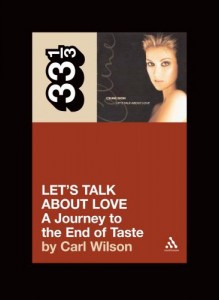
Carl Wilson is an adorably nervous Canadian music critic who lives in Toronto and he came to do a little Q & A with some students here yesterday. Carl wrote a great book in the 33 1/3 series about Celine Dion and we read it in Jonathan Lethem’s masterclass a few weeks ago. That would have been the end of the story if it hadn’t been for James Franco mentioning the book while at the Oscars and a bunch of blogs (Pitchfork, Idolator, The Village Voice, etc.) making a ruckus about it. Then he got invited to be on The Colbert Report, thus leading him to Columbia’s Writing department to say hello and presumably thank James for the name dropping.
Discussed:
-Aesthetic relativism
-Autobiographies of taste
-Remembering that Celine Dion is a human being
More notes after the jump…
The Vicarious MFA

The Vicarious MFA: all the fun of an MFA, without the embarrassing degree!
I had a sad realization last Monday in the Non/Fiction seminar. We were discussing Beauty Before Comfort by Allison Glock. This book came out in 2003 and was a New York Times Notable Book of the Year but just six years later it’s out of print. Benson said this is another good reason to go with an independent publisher, since they tend to keep their stock in print for as long as possible. Even so, it’s a little depressing that your work can get lots of gold stars on minute and be marked way, way down at The Strand the next minute.
We started class with a writing exercize (not a normal practice in a seminar, but a welcome deviation.)
“Describe someone you know in third person, but in the way you think that they see themselves. A paragraph or so into it, add something that they might not nesscessarily know about themselves– your perspective/interpretation of their behavior or personality.” Good fun.
Read David Markson’s Reader’s Block for next Monday. Read Kathleen Norris’s Dakota for Thursday and give a presentation about the transgenerational epigenetic effects of endocrine-disruptive chemicals on mate selection in female rats for Friday. (yikes!)
Also on Friday, Jonathan Safran-Foer is coming to do a talk titled “Intersections” for a small group of grad students (which is neat because usually these lectures get a little crowded and/or infultrated with eager, bad-question-asking undergrads.)
Vicarious MFA: Week in review

The Vicarious MFA
Monday: In Amy Benson’s Non/Fiction class we discussed The Things They Carried. Everybody liked it, said smart things, left feeling hopeful. Read “Beauty Before Comfort” by Allison Glock for next week.
+In Lethem’s class we talked about Joe Brainard’s “I Remember” and Carl Wilson’s “Let’s Talk About Love: A Journey to the End of Taste” which was endorsed by a classmate here.
+Joyce Carol Oates came to lecture. (See notes here.)
Tuesday: I turned in a workshop submission.
Wednesday: Lethem took a group from the class to a secret bookstore which is described here. I bought “What Maise Knew” by Henry James. The copy I got is really old and has an Edward Gorey illustration on the cover. There was a whole section of the store devoted to Edward Gorey covers. I can’t explain how great this place was. If any of you are ever in New York let me know and I will try to get you an appointment there.
Thursday: Discussed In Patagonia by Bruce Chatwin and an awesome profile of Chatwin by David Plante. Read Dakota by Kathleen Norris for next week.
**I feel like including my notes is kind of useless for the VMFA, and that the reading lists are what you really want.**
The Vicarious MFA: Weekend Reading Assignment & Abbreviated Notes

The Vicarious MFA
For Monday:
The Things They Carried by Tim Obrien
I Remember by Joe Brainard
Let’s Talk About Love: A Journey to the End of Taste by Carl Wilson
(I’ve only just started this, but it is awesome. It’s a book that is all about Celine Dion’s album Let’s Talk About Love {the one with the Titanic song on it.} Some chapter titles: Let’s Talk About Schmatlz, Let’s Talk About Hate, Let’s Talk in French and Let’s Sing Really Loud. I am psyched to see Celine Dion burned at the stake of bad taste.)
For Tuesday:
Three Workshop Submissions (60 pages)
Turn-in second workshop piece
For Thursday:
In Patagonia by Bruce Chatwin
For Friday:
More stuff I don’t understand for Psychology elective
(see the presentation I gave last week)
Incredibly abbreviated notes from 2 weeks of The First Book seminar are after the jump….
